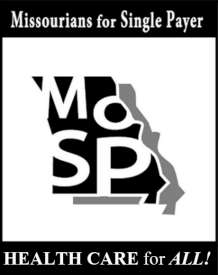MISSOURIANS FOR SINGLE PAYER
HEALTH CARE FOR ALL! | QUALITY HEALTH CARE FOR EVERYONE!
| HOME | EVENTS | NEWS & READINGS... | MEMBERSHIP | LEGISLATION | MEMBERS-FRIENDS | PAST EVENTS | LINKS | ABOUT MOSP | CONTACT US |

Below are the latest Getting the Facts Straight on the Costs and Savings of Medicare for All June 2019 Who are the uninsured Med4All Resolutions: Talking Points for Local Government Officials and Media Medicare-for-All-2022-Exec-Summary Medicare-for-All-2022-Fact-Sheet
|
Ed Weisbart: Protecting Americans from surprise medical costs |
The debate over American health care coverage continues because Congress has failed to find an answer. Medicare ...Breaking news: At the end of 2019, Congress failed to fix a major problem with American health insurance. This would be comically boring if so many lives and so much money were not at stake.(Follow the link above to see Ed Weisbart's column in the St. Louis Post Dispatch)Click on the image above to be taken to the full article in the St Louis Post-Dispatch "Compared to other advanced countries, Americans pay something like $8,000 a year per household in unnecessarily inflated costs under the nation's antiquated health care system. In exchange for what amounts to an inefficiency tax, Americans get worse medical outcomes than much of the developed world." Breaking news: At the end of 2019, Congress failed to fix a major problem with American health insurance. This would be comically boring if so many lives and so much money were not at stake. Chances are that you are among the majority of Americans who have received a surprise medical bill for something you thought was covered by your insurance. It might have been a lab test or prescription drug. It might have been a physician's care or other service administered when you went to an emergency room or hospital. Or it might even have been that you didn't realize you still have lots of deductible to meet before your insurer would pay anything. The most recent data shows that 43% of emergency room visits and 42% of hospitalizations among privately insured Americans came with an "out-of-network" bill. And these bills are frequently large enough to be financial disasters: an average of $628 in the emergency room, and more than $2,000 for a hospitalization. When asked how they would deal with an unexpected $500 medical bill, only 34% said in a poll that they could pay it outright. Nineteen percent said they would be unable to pay it all; 20% would put it on a credit card to pay off over time; 13% would put it on a credit card to pay the following month; 7% would borrow from a bank, payday lender, friend or family or make some sort of arrangement with the physician or hospital. Sixteen percent of Americans have had to cut back on groceries, 17% cut back on clothing, 11% on non-Rx drugs, 8% on utilities, and 19% on our recreation - all just to pay for health care. The problem is growing worse; 36% of people in small group plans, and an astonishing 71% of people with individually purchased insurance, now have plans that provide no coverage at all for out-of-network care. One way or another, most Americans have had to deal with surprise medical bills. And across all party lines, 57% of us want this fixed even if that means hospitals or physicians would get paid less. Of course, the only physicians who might be paid less would be those taking unfair advantage of this problem and willfully extracting more money from their patients. Shouldn't Congress simply pass a bill to address it? The flaw in that logic was the word "simply." You may have noticed, they tried last month. Even with bipartisan support, the lobbyists wouldn't let it happen. And if you've not noticed, those powerful lobbyists run Congress. Whenever we start piece-mealing our solution to the health care crisis, we create gaps and loopholes that the free market is happy to exploit. Compare how these surprise bills would be addressed under a robust solution - Medicare for All - as opposed to a "public option." Medicare for All would cover every American for all necessary care, including dentistry, eyeglasses, and hearing aids, while eliminating all copays and deductibles. It would be funded as are all other public services like schools, defense and fire departments. Surprise medical bills would be impossible. The public option would do nothing to prevent surprise bills from emergency visits or hospitalizations, nothing to prevent surprise bills from unbearable deductibles and copayments, and would let our health care system grow increasingly complex and unsustainable. Surprise bills from emergency care would not change under a public option. Private insurers could continue to refuse to cover out-of-network care. Under Medicare for All, all facilities would be covered, and patients would never be billed. Surprise bills from hospital care would not change under a public option. Private insurers could continue to refuse to cover any out-of-network physicians and services, even as part of inpatient hospital care at an in-network hospital that the insurer approved in advance. Under Medicare for All, there would be no more networks and patients would never be billed directly. Congress failed to solve this as a stand-alone problem. Don't let them trick you into thinking a public option would solve it. If you hate surprises - particularly medical bill surprises - join the fight for Medicare for All. Accept no imitations or faux solutions. Ed Weisbart, MD, chairs the Missouri chapter of Physicians for a National Health Program. He lives in Olivette.
|
